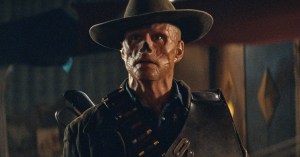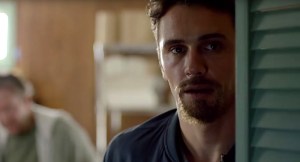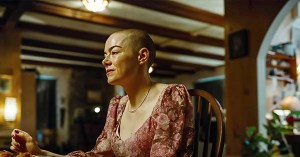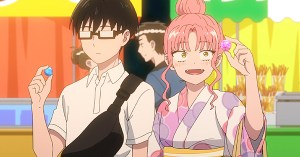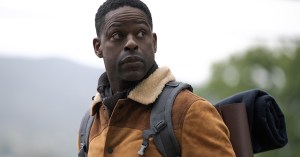Garrett Hedlund Talks On the Road
The rising young star discusses the pressure of bringing to screen Jack Kerouac's iconic work of the Beat Generation.
Jack Kerouac’s On the Road is easily one of the most famous American novels of the 20th century, so it’s no small surprise that — unlike contemporary Beat Generation giants Naked Lunch and Howl — the seminal 1957 work has taken this long to reach the movie screen. Not that there haven’t been attempts: Kerouac himself reportedly tried to entice Marlon Brando to star in a movie version, and the book rights were later acquired by Francis Ford Coppola, who shepherded the project through more years of development.
At last, Motorcycle Diaries director Walter Salles came on board, and the result is this week’s On the Road — a languid, sun-kissed riff on the classic starring Garrett Hedlund, Sam Riley, Kristen Stewart and a host of stars (Viggo Mortensen, Amy Adams, Kirsten Dunst) in smaller character roles.
We sat down recently with Hedlund — who plays the story’s iconic drifter, Dean Moriarty — where he talked about his love of the book and the pressure of starring in a tale with so much cultural import.
Luke Goodsell: This film has a long development history, going all the way back to the ’50s when Kerouac supposedly tried to interest Marlon Brando in the project. Did you feel a lot of weight taking on this role in such an influential work of pop culture?
Garret Hedlund: It was just the self-imposed pressure of being a fan, as well — because I’ve always been influenced by Kerouac, his writings, and I was introduced to it through On the Road and that kind of spontaneous prose. It was a whole new way to document experience and fuse that a little bit with imagination. Whereas everybody else was so concerned with format, it was liberating to see someone, you know, cut the handcuffs and go an create their own path.
So with this, it was a little tricky, ’cause when I first met [director] Walter [Salles], he was inspired by not only Kerouac but also Dean Moriarty, the character in th book, and how he approaches life — this sort of free spirit, and this neverending amount of energy that he has. That was a little nerve-wracking, meeting him for the first time. But I wrote a long piece of writing for Walter, because I was coming back from the farm in Minnesota and I just kind of documented the journey: we were crossing the same kind of cornfields at sunset, and the people I came across, and, you know, sheriffs sitting across from me at the bar saying wonderful things that you can’t not write down. And I was able to read Walter this after doing my first reading with him, and that was wonderful — even though the pages were shaking uncontrollably in my hand. It was a lot of pressure. But yeah, between Neal Cassady and all the letters and books and the Beat Museum there’s a plethora of things to see that you can pick up, and an insane amount about this man that few knew in this way. I mean they know about things from On the Road, but they don’t know about Cody Pomeray from Visions of Cody, they’ve never read the books of letters, you know.
LG: Sounds like you did your homework. What was your very first experience with On the Road? Was it at school?
GH: Yeah, it was. I was such a fan of Fitzgerald, and Salinger — I was really big into Salinger at the time — and once I’d finished reading, you know, all of Salinger, I got into Kerouac. I remember somebody had spoken about him before, and I was going through creative writing at this time so it left a huge impression on me, to how I wrote at that time. You know, trying to write a good story and excluding format, being a “B” instead of an “A” because you’d sort of been following the rules. I felt much more fulfilled that way.
LG: So it wasn’t just the pressure of the book’s place in pop history — it was its importance to your own.
GH: Right. But I kinda wanted that pressure. And back then I looked online to see if it was ever going to be made into a film, and it said that Francis Ford Coppola was directing it, and I was like, “Ah, the director of The Godfather — I’ll never get a f**king chance at this.” That’s why it’s still surreal sitting here [talking about the movie], and I owe it all to Walter. He’s been on this since 2005, and did the trek a couple times across country to retrace the routes, just to see if he could find On the Road and what it meant to all these people. It gave him a wonderful understanding of this generation, and these men. So I owe it all to them.
LG: Tell me a little about Walter’s “Beatnik Bootcamp” he put you through for the film.
GH: Well once they finally greenlit the film, it happened so fast. Most films have three or four months of pre-production but this film had only six weeks — and four of those weeks were us in this kind of bootcamp. I mean, it wasn’t really a bootcamp with obstacle courses and things to climb and sh*t like that [laughs], we had, you know, photos covering the walls of the people at that time, and the places we were filming, so we could get an idea of where we are at this very moment. While we were rehearsing it we had biographers and family friends come in and spend time with us and share their knowledge of these people that had filled their lives. I mean, biographers have been working on the Beat Generation, and more specifically Kerouac, you know, since the ’60s, so these were the most important voices to be around at the time. Really it was just us spending four weeks together in one room, surrounded by books, notepads and pens, movies from that time — old Cassavetes ones that Walter would show us.
LG: I imagine Shadows would have been one.
GH: Shadows, yeah, and also this one called The Exiles, which showed maybe ’50s Los Angeles that was kind of archival footage — the footage was found and edited together, and I don’t think it came out ’til years later.
LG: Was it hard to connect with the rhythms of life in that time period, given that it’s almost 60 years ago now?
GH: I think it was nice. I mean, as soon as we would sit around and turn on the record player and we had all the books of this time, and, you know, being such a fan of it you can’t help but feel it overtaking you. You’re listening to jazz, and seeing how they do it the whole time within this, you give in to that, I think — more than most projects. Within the film, Sam [Riley] and I are smoking non-filtered Camels the whole time. I bought a ’53 Hudson before we started filming, so I could drive around and start feeling it beforehand. And then once we’re driving around in Montreal, the whole time we’re in the wardrobe, you know, and we’re fans of the material.
LG: Those things must be hard to drive.
GH: [Laughs] Yeah, I know. No power steering, like any of them back then, but it’s a 4500-pound car.
LG: Were the cigarettes the only things, substance-wise, that put you back in character on location? You weren’t really indulging in Benzedrine?
[Laughs] Yeah, you know, the nice thing about a lot of those — and how to make those scenes authentic — was Al Hinkle, who’s Ed Dunkle in the book, got on Skype with us. He was in San Jose and we were in Montreal, and the prop designer had built many of these little babies [Benzedrine] that looked like they did back in the day, so he instructed us how they did it with the bottom of the beer bottle — crack on one side, crack on the other, and safely take it apart.
LG: It was interesting to see it being done on film.
GH: Yeah. When you know that half a strip will keep you high for eight hours, and one full strip will keep you high for 22, then you get a sense of how you would be performing under these circumstances.
LG: Right, that’s… instructive. So you pieced together these characters from a lot of different sources, then.
GH: Yeah, to find the souls of a lot of these characters. Kristen [Stewart] had the benefit of hours and hours of audio tapes of [her character] Louann Henderson speaking and telling stories, and even I benefited ’cause you could hear the love in her voice, you know, when she talks and she laughs. She would say things like, “Oh, you know, me and Jack would dance,” and you just saw this rare soul. She didn’t pass judgment on anything. She soaked up life, just like the rest of these guys. She was so far beyond her years. But also the letters they all wrote to each other gave us so much of their soul, and the way they expressed things — bravely and honestly, and also ridding themselves of their inhibitions and fears. They become so infectious in your mind that you wish you knew somebody like that. All we had to do was portray somebody everyone wishes they knew. [Laughs]
On the Road opens in theaters this week.

